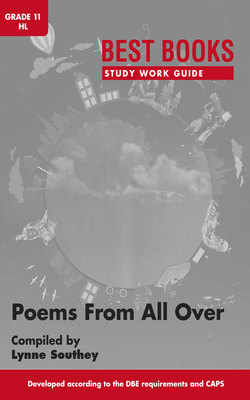Читать книгу Best Books Study Work Guide: Poems From All Over Gr 11 HL - Lynne Southey - Страница 6
На сайте Литреса книга снята с продажи.
Discussions of poems They Flee From Me by Thomas Wyatt
Оглавление(See p. 1 in Poems From All Over)
| Title: | The woman (or women) who used to come to the speaker now avoid(s) him. |
| Theme: | Past love and what used to be. |
| Mood: | Reminiscent, sad. |
Discussion
Remember that a poem can be interpreted differently by different readers. To demonstrate this, the interpretation here differs slightly from that in your anthology. The anthology takes the “they” literally, and assumes that there were many women in the speaker’s life. The interpretation here is that the “they” refers to one woman in particular.
The speaker remarks on the fact that a woman used to happily seek him out, and how happy and grateful this made him. She would allow him to master and dominate her, to tame her. This doesn’t happen anymore. Then he remembers one time when she changed. She became the dominant one who tamed him. However, she left him for new adventures. The speaker ends by wondering whether he was too kind to her and that is the reason she left him, and he wonders what happened to her afterwards.
The poem, a lyric, is written in rhyme royal, which means that it uses the rhyme scheme ababbcc. There are seven lines to each of the three stanzas. Each stanza has a separate idea. The first stanza tells us that the speaker has been rejected by his lover, the second stanza what it was like with her and how he enjoyed it, and in the third stanza he speculates as to why she left and wonders what has become of her.
Sir Thomas Wyatt’s (1503–1542) work seem to deal with romantic love and mistresses – he was charged with adultery and having an affair with Anne Boleyn (Queen of England from 1533–1536).
Analysis
| Stanza | Comment | |
| 1 | Line 1 gives the topic of the poem. The woman used to come into his room, barefoot, “stalking” him. She used to be tame with him but later became wild and risked the danger of being found out; but now she has left him to look for something different. | Although the speaker mentions “they”, we can assume that he is referring to one woman. He likens her behaviour to that of a tame animal that would feed from his hand. “Stalking” implies that she is the one who started the relationship.Notice the antonym (word with opposite meaning) for “gentle, tame, and meek” in “wild”, indicating how the woman changed. She seems to have forgotten the risks she took to be with him, coming into his room. This implies that their relationship was secret and probably wrong. (Was she married to someone else?)Notice the run-on line (lines 5 and 6, where there is no pause at the end of line 5), which leads to the break in the middle of line 6 and the short phrase that follows it. This suggests the sudden change in the relationship and the bitterness the speaker feels. |
| 2 | The second stanza refers to the way things used to be. He realises he was lucky (“Thanked by Fortune”) and describes her coming to him lightly dressed and letting her clothes slip off, she would take him in her arms, seemingly wanting to please him (“Dear heart, how like you this?”). | The “twenty times better” shows how unhappy he is about the way things are now, compared with what they were.The description of the woman undressing and kissing him confirms the romantic and sexual nature of the relationship. We understand how the loss of the woman is hurting him. |
| 3 | In thinking about how things used to be with the woman, he asserts that he was not dreaming it, it really happened (“I lay broad waking”). He reasons that it was his own gentleness that caused her to change and leave him, giving him his freedom too. He sees it as “newfangleness” that she wanted, someone different. He bitterly, almost angrily, asks what response he should show to her rejection when he was so kind to her.*“newfangleness” is believed to be Chaucer’s word (Wyatt admired Chaucer’s work). | The speaker seems to be reassuring his reader and himself about how good the relationship was. He tries to explain that it must have been his gentleness that made her end the relationship. He is almost scornful of her in referring to her desire for some new fashion of lover, as the word “newfangleness” seems to imply.His tone changes in the last two lines when he asks how, given that he was so kind to her, he should treat her. Or we can see him being sarcastic (meaning the opposite of what is said) in the use of “kindely”, where he means the opposite: he is asking how he should treat her given how badly she treated him in leaving him. |
Contextual questions
1.What do you understand by “that” in the first line? (2)
2.The speaker says the woman doesn’t remember that she “put (them) in danger” when she came to him. Why do you think he says this? (3)
3.What is the tone of the second stanza? In other words, what do you think the speaker is feeling, or what emotion is he conveying by his words? How does this contrast with the tone of the third stanza? (3)
4.Line 15 is a statement. What do you think causes the speaker to make it? (3)
5.List any four words in the third stanza that show us the poem was written in 1557. (4)
(15)
